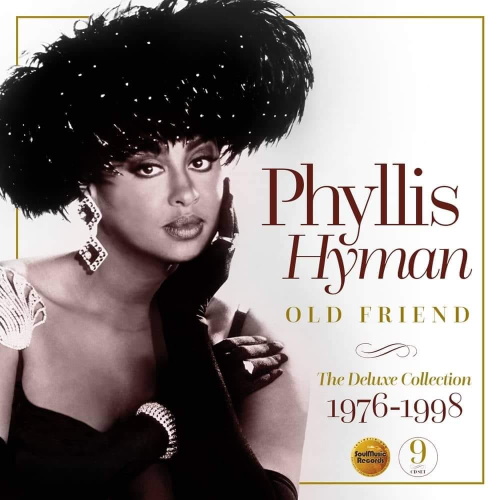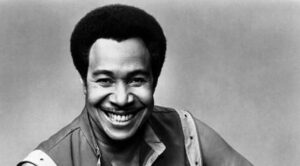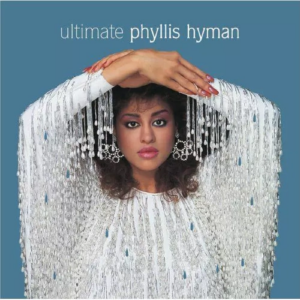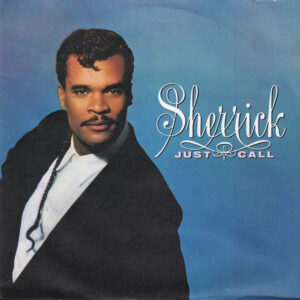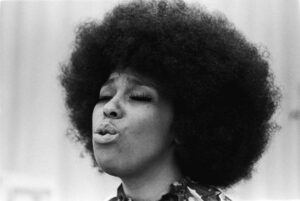By Jason A. Michael
Though she’s been gone for 29 years now, fans continue to remember – and younger folk continue to discover – the late, great sultry songstress Phyllis Hyman, who would have turned 75 on July 6. If you’ve ever seen her, standing 6 feet ½ inches tall and usually wearing a regal cloth crown upon her head, you’re sure to have never forgotten her. And if you’ve ever heard her, you know that hers was a voice that is timeless.
Legendary vibraphonist Lionel Hampton once remarked that Phyllis was in a rare class of vocalist, “right up there with Ella Fitzgerald.” Black American magazine said in 1977 that she was destined to become the next Billie Holiday. Phyllis, herself, confessed that she struggled to be as good as her idol, Nancy Wilson. But Phyllis, with that voice of satin and stardust, was truly one of a kind.
Birthdays were a big deal to her
While she lived, birthdays were extremely important to Phyllis. She loved to have parties and be made to feel special. She would create wish lists to share with friends and staff. Heck, during one week-long stint at her regular stomping grounds, Washington, DC’s Blues Alley, she shared such a list with her audience. “I need linens,” she told the incredulous crowd. “Sheets, king size, something sexy.”
And she was pragmatic about the whole thing – somewhat. In 1994, Phyllis was recording in Los Angeles with friend and super producer Nick Martinelli, who by now had five number one R&B hit records under his belt, when she asked him to throw her a birthday party. Nick began to call assorted friends, many of whom didn’t even know Phyllis, and invited them over for said party. Phyllis even shared her wish lists with them.
The list ran the gamut from expensive perfume to Bounty brand paper towels, which Phyllis used to help take off her makeup. “You have to have a gift for every budget,” she told Martinelli, who remained skeptical. “I thought, what’s she gonna do with some paper towels?” he said. “Carry them back with her to New York?”
But for Phyllis it wasn’t the size of the gift, it was that someone thought enough about her to give her something. Phyllis was used to working for all she had. Married only for a short time to musician Larry Alexander, who produced a few of her early records, Phyllis remained single for the rest of her life. In short, it was on her and no one else to bring home the bacon, keep the rent on her Manhattan apartment paid and her band and growing staff with cashable paychecks. She also, of course, sent money home every month to her mother.
The root of her pain
Philadelphia International Records label head Kenny Gamble, upon signing Phyllis, said that he heard a note of pain in her voice. That pain went all the way back to her childhood, growing up the eldest of seven children of an alcoholic father and a mother often times incapacitated by her depression and mental illness. Phyllis also often sang of unrequited love. From her first major label single, the Thom Bell-written “Loving You – Losing You,” to a string of songs tailormade for Phyllis by Gamble, Bell and Gamble’s production partner and co-label head Leon Huff, Phyllis could sell pain like no other. “Old Friend,” “Living All Alone,” “Living in Confusion” and the posthumously released “I Refuse to Be Loney” perpetuated the myth that Phyllis never knew true love.
Phyllis did have her share of breakups, but that just means she had her share of lovers. Even today, there are folks who still think that Phyllis killed herself over a man or because one dumped her. Or they blame Clive Davis for pushing her over the edge. These theories are not only wrong, but they do Phyllis no justice. Yes, Phyllis knew heartbreak. And, yes, she could wring every ounce of hurt out of a sad, sad song. But it was mental illness – untreated bipolar disorder and the substance abuse that was her self-medication – that ultimately took her life.
Phyllis, not many people know, was actually in a relationship at the time she took her life. She was also in a relationship at the time she released “Living All Alone.” These were good men she was involved with. They loved and cared for Phyllis deeply. Admittedly, her illness would at times cause her to eventually self-sabotage her happiness. She did, however, know much happiness. Phyllis loved to laugh, and she laughed quite a lot in her lifetime.
Back to the music
Phyllis released a total of eight albums over her 20-year career. Two additional albums of new material were released posthumously. A few years ago, all 10 albums were released as a box set. The sad songs were prevalent, and the Quiet Storm favorite solidified her reputation for being the go-to artist when you needed to put music to your heartbreak. Still, we must remember that Phyllis was more than her pain.
Nearly 30 years after her passing, and she is still revered by her fanbase. This is evident by the fact that a stage play about her life is currently touring the nation. In addition, UK-based singer Candace Woodson has just released the single “Over and Over,” a Phyllis-tribute that interweaves Phyllis song titles and lyrics throughout. The song is a Soul Tracks Choice Cut.
Phyllis did not necessarily become larger in death than in life, as some had predicted she would. In fact, editors said not enough people remembered her, or that she hadn’t become a “cult icon” in the years since her passing, as they rejected her authorized biography, which ultimately had to be self-published. (It went on to become an Essence bestseller.)
New fans continue to find Phyllis though. Discriminating parents have introduced their children to her. Young music lovers continue to discover her beautiful artistry. The rebirth of vinyl has helped. But she still tragically hasn’t received the recognition that her talent warrants.
Had she not taken her life, it’s interesting to consider where Phyllis would be today as she turned 75. Would she have recorded that long-awaited jazz album? Would that have led to a new audience, a Grammy perhaps? There’s no way to know. For now, we can only be thankful for the musical legacy she left us. And do our part to introduce her to others and keep her and her music alive. That’s the greatest gift we can give her now.
So Happy Birthday, Phyllis. We still, and always will, love you.
Jason A. Michael is the author of the authorized biography Strength of a Woman: The Phyllis Hyman Story.
Celebrating Phyllis Hyman on her 75th birthday
By Jason A. Michael
Though she’s been gone for 29 years now, fans continue to remember – and younger folk continue to discover – the late, great sultry songstress Phyllis Hyman, who would have turned 75 on July 6. If you’ve ever seen her, standing 6 feet ½ inches tall and usually wearing a regal cloth crown upon her head, you’re sure to have never forgotten her. And if you’ve ever heard her, you know that hers was a voice that is timeless.
Legendary vibraphonist Lionel Hampton once remarked that Phyllis was in a rare class of vocalist, “right up there with Ella Fitzgerald.” Black American magazine said in 1977 that she was destined to become the next Billie Holiday. Phyllis, herself, confessed that she struggled to be as good as her idol, Nancy Wilson. But Phyllis, with that voice of satin and stardust, was truly one of a kind.
Birthdays were a big deal to her
While she lived, birthdays were extremely important to Phyllis. She loved to have parties and be made to feel special. She would create wish lists to share with friends and staff. Heck, during one week-long stint at her regular stomping grounds, Washington, DC’s Blues Alley, she shared such a list with her audience. “I need linens,” she told the incredulous crowd. “Sheets, king size, something sexy.”
And she was pragmatic about the whole thing – somewhat. In 1994, Phyllis was recording in Los Angeles with friend and super producer Nick Martinelli, who by now had five number one R&B hit records under his belt, when she asked him to throw her a birthday party. Nick began to call assorted friends, many of whom didn’t even know Phyllis, and invited them over for said party. Phyllis even shared her wish lists with them.
The list ran the gamut from expensive perfume to Bounty brand paper towels, which Phyllis used to help take off her makeup. “You have to have a gift for every budget,” she told Martinelli, who remained skeptical. “I thought, what’s she gonna do with some paper towels?” he said. “Carry them back with her to New York?”
But for Phyllis it wasn’t the size of the gift, it was that someone thought enough about her to give her something. Phyllis was used to working for all she had. Married only for a short time to musician Larry Alexander, who produced a few of her early records, Phyllis remained single for the rest of her life. In short, it was on her and no one else to bring home the bacon, keep the rent on her Manhattan apartment paid and her band and growing staff with cashable paychecks. She also, of course, sent money home every month to her mother.
The root of her pain
Philadelphia International Records label head Kenny Gamble, upon signing Phyllis, said that he heard a note of pain in her voice. That pain went all the way back to her childhood, growing up the eldest of seven children of an alcoholic father and a mother often times incapacitated by her depression and mental illness. Phyllis also often sang of unrequited love. From her first major label single, the Thom Bell-written “Loving You – Losing You,” to a string of songs tailormade for Phyllis by Gamble, Bell and Gamble’s production partner and co-label head Leon Huff, Phyllis could sell pain like no other. “Old Friend,” “Living All Alone,” “Living in Confusion” and the posthumously released “I Refuse to Be Loney” perpetuated the myth that Phyllis never knew true love.
Phyllis did have her share of breakups, but that just means she had her share of lovers. Even today, there are folks who still think that Phyllis killed herself over a man or because one dumped her. Or they blame Clive Davis for pushing her over the edge. These theories are not only wrong, but they do Phyllis no justice. Yes, Phyllis knew heartbreak. And, yes, she could wring every ounce of hurt out of a sad, sad song. But it was mental illness – untreated bipolar disorder and the substance abuse that was her self-medication – that ultimately took her life.
Phyllis, not many people know, was actually in a relationship at the time she took her life. She was also in a relationship at the time she released “Living All Alone.” These were good men she was involved with. They loved and cared for Phyllis deeply. Admittedly, her illness would at times cause her to eventually self-sabotage her happiness. She did, however, know much happiness. Phyllis loved to laugh, and she laughed quite a lot in her lifetime.
Back to the music
Phyllis released a total of eight albums over her 20-year career. Two additional albums of new material were released posthumously. A few years ago, all 10 albums were released as a box set. The sad songs were prevalent, and the Quiet Storm favorite solidified her reputation for being the go-to artist when you needed to put music to your heartbreak. Still, we must remember that Phyllis was more than her pain.
Nearly 30 years after her passing, and she is still revered by her fanbase. This is evident by the fact that a stage play about her life is currently touring the nation. In addition, UK-based singer Candace Woodson has just released the single “Over and Over,” a Phyllis-tribute that interweaves Phyllis song titles and lyrics throughout. The song is a Soul Tracks Choice Cut.
Phyllis did not necessarily become larger in death than in life, as some had predicted she would. In fact, editors said not enough people remembered her, or that she hadn’t become a “cult icon” in the years since her passing, as they rejected her authorized biography, which ultimately had to be self-published. (It went on to become an Essence bestseller.)
New fans continue to find Phyllis though. Discriminating parents have introduced their children to her. Young music lovers continue to discover her beautiful artistry. The rebirth of vinyl has helped. But she still tragically hasn’t received the recognition that her talent warrants.
Had she not taken her life, it’s interesting to consider where Phyllis would be today as she turned 75. Would she have recorded that long-awaited jazz album? Would that have led to a new audience, a Grammy perhaps? There’s no way to know. For now, we can only be thankful for the musical legacy she left us. And do our part to introduce her to others and keep her and her music alive. That’s the greatest gift we can give her now.
So Happy Birthday, Phyllis. We still, and always will, love you.
Jason A. Michael is the author of the authorized biography Strength of a Woman: The Phyllis Hyman Story.
